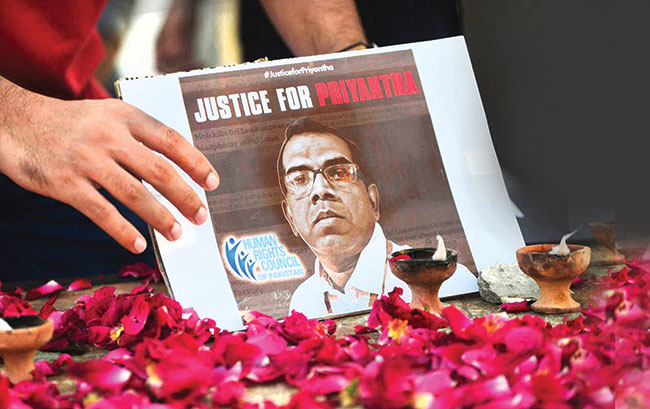Features
Pakistan strikes enlightened note on interfaith harmony

Pakistan could be said to have gone beyond mere damage-control by calling for a collective effort on the part of polities to prevent tragedies of the kind that occurred a few weeks back when a factory manager of Sri Lankan origin, Priyantha Kumara, was done to death in a most barbaric fashion in Sialkot by a demented mob.
Notables in the Pakistani government, such as its Minister of Religious Affairs Dr. Noorul Haq Qadri and its Human Rights Minister Dr. Shireen Mazari, are on record as calling for inter-religious harmony and tolerance and this is the way to go in this hour when religious extremism is taking a heavy toll on intra-state and inter-state harmony in South Asia in particular.
Dr. Qadri was most explicit in his condemnation of the killing. ‘Prophets spread teachings of love and forgiveness. The Sialkot tragedy has to be condemned at all levels. Those who tortured and killed Priyantha Kumara in the name of faith had not done any service but violated the principles of Islam, he said. Dr. Mazari called on the country’s many religions to work together to bring stability and global prestige to Pakistan. She explained that human rights, religious tolerance and brotherhood were values espoused by all religions. Religious tolerance and harmony are imperatives, the minister was quoted saying.

One could wholeheartedly agree with the ministers that what is called for in this connection is a collective effort at peacebuilding. Governments are, no doubt, primarily responsible for originating and sustaining a pro-peace culture in a country but they are not the only party to figure in this hallowed exercise. Think tanks, artists and the media, to name just three such quarters, need to shoulder this responsibility of planting and nurturing religious tolerance, peace and brotherhood among peoples and cultures.
Even if one were not thinking seriously about nation-building and its important implications for multi-identity countries and regions, commonsense ought to dissuade those sections that are prone to speak and act on the basis of divisive ideologies to think long and deep on this dangerous proclivity of theirs before actively perpetuating it. For one thing, almost all the countries in Asia are multi-religious, multi-ethnic and multi-lingual. The presence of groups in a country that one is not happy with, just cannot be wished away or eliminated. They have to be lived with and cordially related to, since genocide will never be tolerated by the international community.
Besides, any harmful actions directed at such groups could eventually lead to equally hostile actions directed at oneself by such victims. Thus, the way will be paved for intra-state friction and disharmony from which no one would gain. This lesson ought to have been learnt from the time many of our countries in South Asia gained ‘independence’. Therefore, as a matter of principle or on account of pragmatic considerations inter-group harmony needs to be consistently cultivated by governments and other responsible sections that have democratic development as one of their aims.
Even if a state is theocratic in orientation, if governments in such dispensations aim seriously at realizing religious harmony as a matter of policy, antagonisms among religious groups could be managed to a degree. The challenge before governments in South Asia, for example, is to foster inter-religious harmony as a matter of firm policy and not to cave in, with an eye on short term political gain, to those groups that champion religious chauvinism and extremism. This is particularly applicable to the pressures on governments emanating from extremist outfits claiming to represent the interest of religious majorities.
Unfortunately, thus far, governments in our part of the world have, more often than not, pandered to these destructive forces. Needless to say, in the case of those states that claim to be democratic, such faint-hearted accommodation of extremists claiming to champion the interests of religious majorities, has led to the undermining of democratic institutions and values.
Ideally, states claiming to be democratic need to be securely anchored in the principle of secularism. That is, in their Constitutions, there need to be enshrined unambiguous principles separating religion from politics. However, the majority of states in South Asia are not secular in the true sense of the term. To the extent to which a state does not adhere to secularism, while claiming to be democratic, to the same degree will it prove a failed democratic state.
The Pakistani state, nevertheless, has done well to highlight some core civilizational values that unite the majority of countries and peoples of South Asia. May be, Pakistan could take a lead role in bringing into being a South Asian forum where eminent minds and spirits of the region could meet and discuss ways of uniting the peoples of the region on the basis of these shared values.
It is also of the greatest importance that the Pakistani government has been clear about the fact that Islam does not preach and practise religious hatred and bigotry. Every significant section claiming adherence to Islam needs to do likewise and disassociate itself from such hatreds and animosities. This will go a long way in getting ‘Islamic terror’ out of the vocabulary of many English speakers. The unfortunate inability to do so thus far has done Islam considerable harm. The fact that Islam does not endorse inter-religious hatred needs to be enshrined in minds as a cardinal truth about this revered faith.